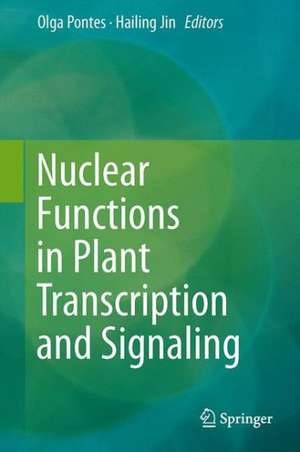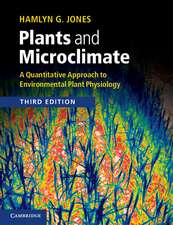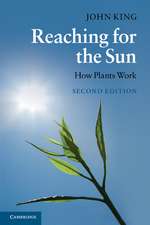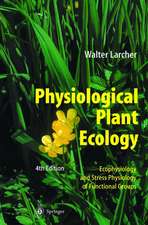Nuclear Functions in Plant Transcription, Signaling and Development
Editat de Olga Pontes, Hailing Jinen Limba Engleză Hardback – 3 iun 2015
| Toate formatele și edițiile | Preț | Express |
|---|---|---|
| Paperback (1) | 635.31 lei 6-8 săpt. | |
| Springer – 9 oct 2016 | 635.31 lei 6-8 săpt. | |
| Hardback (1) | 641.53 lei 6-8 săpt. | |
| Springer – 3 iun 2015 | 641.53 lei 6-8 săpt. |
Preț: 641.53 lei
Preț vechi: 754.74 lei
-15% Nou
Puncte Express: 962
Preț estimativ în valută:
122.77€ • 127.70$ • 101.36£
122.77€ • 127.70$ • 101.36£
Carte tipărită la comandă
Livrare economică 15-29 aprilie
Preluare comenzi: 021 569.72.76
Specificații
ISBN-13: 9781493923854
ISBN-10: 1493923854
Pagini: 275
Ilustrații: X, 182 p. 21 illus., 18 illus. in color.
Dimensiuni: 155 x 235 x 17 mm
Greutate: 0.45 kg
Ediția:2015
Editura: Springer
Colecția Springer
Locul publicării:New York, NY, United States
ISBN-10: 1493923854
Pagini: 275
Ilustrații: X, 182 p. 21 illus., 18 illus. in color.
Dimensiuni: 155 x 235 x 17 mm
Greutate: 0.45 kg
Ediția:2015
Editura: Springer
Colecția Springer
Locul publicării:New York, NY, United States
Public țintă
ResearchCuprins
RNA-directed DNA methylation and transcriptional silencing in Arabidopsis.- The role of DNA methylation in transposable element silencing and genomic imprinting.- Nuclear Bodies and Responses to the Environments.- Plasticity of Chromatin Organization in the Plant Interphase Nucleus.- Role of Epigenetic Modifications in Plant Responses to Environmental Stresses.- Setting the Stage for the Next Generation: Epigenetic Reprogramming during Sexual Plant Reproduction.- Epigenetic Modifications at Developmental Transitions in Arabidopsis.- Mechanisms of Transposable Element Evolution in Plants and their Effects on Gene Expression.- Population Epigenetics.
Recenzii
“This is a very informative and balanced volume on the fascinating area of plant epigenetics. All authors have done a very good job to include the recent literature. … for readers interested in plant epigenetics, it can be strongly recommended as a highly informative and well-balanced read.” (Isabel Bäurle, Journal of Plant Physiology, Vol. 192, 2016)
Notă biografică
Olga Pontes University of New Mexico One University Biology Department 288 Castetter Hall
Hailing Jin Department of Plant Pathology and Microbiology, University of California 3234B Genomics Building Riverside, CA 92521
Hailing Jin Department of Plant Pathology and Microbiology, University of California 3234B Genomics Building Riverside, CA 92521
Textul de pe ultima copertă
This book compiles a series of landmark discussions on the recent advances in plant nuclear biology research, and offers new perspectives into the functional relevance of the arrangement of genomes and nuclear processes that impact plant physiology and development. The work provides insight as to how genes are switched on or off and are tuned to specific expression levels, which allow us to better predict plant phenotypes. Overall, a better understanding of the fundamentals of plant gene expression will aid in the more efficient design of numerous biotechnological applications and plant breeding programs. This new knowledge will provide a foundation for solving both agricultural and environmental problems as well as developing practices that enable global sustainability. Plant biology is also relevant to human biology, as several aspects of underlying mechanisms are conserved between both organisms. Understanding this shared biology will shed light on human diseases, and could leadto better therapies for cancer and genetic diseases.
Caracteristici
Landmark discussions of the recent advances in plant nuclear biology research Cutting edge plant research Internationally renowned editors and contributors Offer new perspectives into the functional relevance of the arrangement of genomes and nuclear processes that impact plant physiology and development Includes supplementary material: sn.pub/extras







